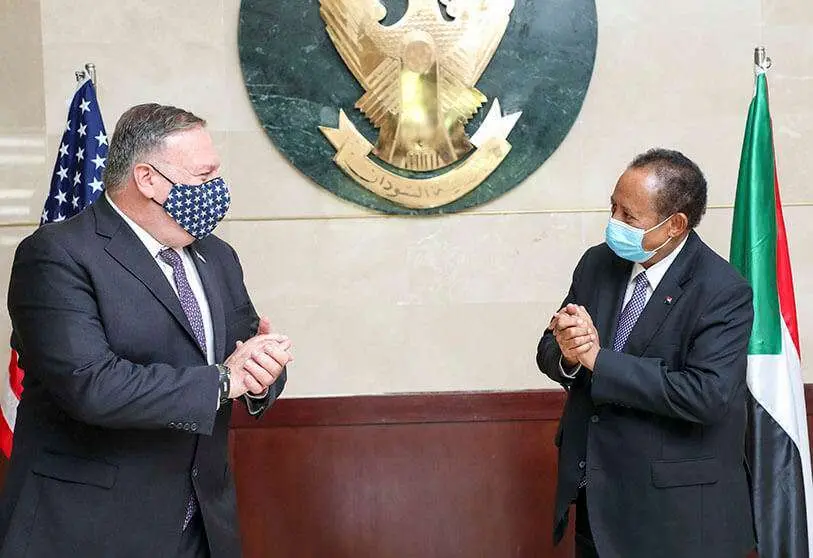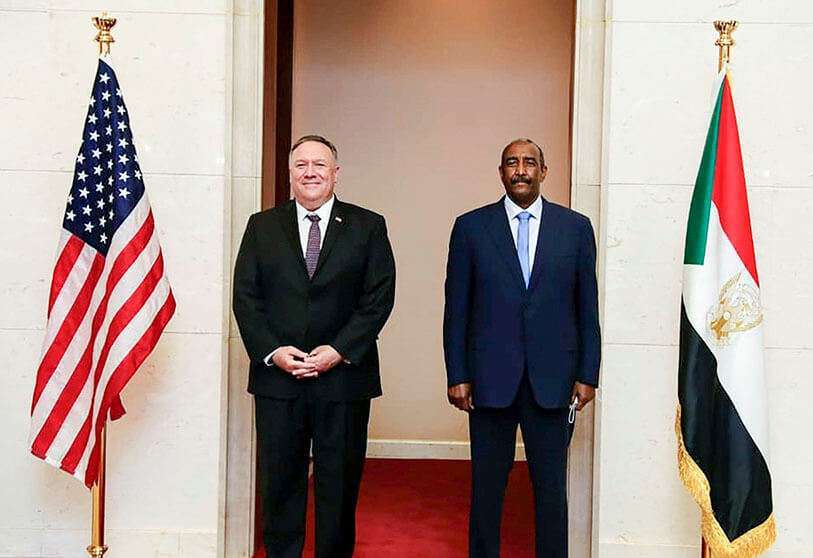Successful US-Sudan meeting on the future of the African country

Meeting in the United Arab Emirates, a Sudanese delegation led by General Abdel-Fattah al-Burhan, head of the council, flew to the UAE on Sunday to hold talks with U.S. officials on several issues including how Khartoum would advance the Arab-Israeli peace process and the removal of Sudan from a U.S. list of state sponsors of terrorism.
According to a communiqué issued by the Sudanese authorities and picked up by the Reuters news agency, both delegations held talks on how peace could stabilise the region and secure a two-state solution to the Israeli-Palestinian question, the ruling sovereign council said.
In a letter sent to Senate Majority Leader Mitch McConnell on Wednesday, US Secretary of State Mike Pompeo urged for the Sovereign Immunities Act to be passed, a law that paves the way for a settlement deal between the United States and Sudan, thus opening the door for Sudan to be lifted from the list of State Sponsors of Terrorism.

At the end of August, the US Secretary of State, Mike Pompeo, paid the first visit to the African country by a high-ranking US official. The trip, which lasted barely a few hours, did not achieve the result both sides had hoped for, as Washington's aim was to win Israel a new ally in the Middle East, but Khartoum refused to normalise relations with the Jewish country.
"The transitional government does not have an authorization … to decide on matter will be decided once the institutions of the transitional power are completed,” said the Sudanese government's spokesman, Faisal Saleh, at the time.
The press conference scheduled after Pompeo's trip, together with Sudanese Prime Minister Abdalla Hamdok, was suspended after it became known that the meeting between the two delegations had not achieved its objectives: for Khartoum to establish relations with Israel and for Washington to remove Sudan from the list of countries sponsoring terrorism. The African country has been on this list since the 1990s when Osama Bin Laden, leader of al-Qaeda, was a guest of former president Omar al-Bashir's government.
But this time it appears that some progress has been made. A Sudanese team led by General Abdel-Fattah al-Burhan, head of the council, flew to the UAE where they held “serious and frank talks” on the future of Arab-Israeli peace, which would lead to “stability in the region and preserve the right of the Palestinian people to establish their state according to the vision of a two-state solution”, according to Reuters.
Since Al-Bashir was overthrown, relations with Washington have improved considerably and relations with Israel, always a sensitive issue with the Arab country, have also been finding normalisation. In February, Mr Burhan met the Israeli prime minister, Benjamin Netanyahu, in Uganda. This encounter was condemned by most Sudanese during demonstrations and raised some doubts about the normalisation of ties, although Israeli planes began to fly over Sudan.
Hamdok recalled during Pompeo's trip that “the transitional phase in Sudan is led by a broad coalition with a specific agenda: to complete the transition process and achieve peace and stability in the country, until free elections are held".
The United States pledged to Sudan that, if they compensated the victims and cooperated in the fight against terrorism, they would remove the country from the blacklist.
In Pompeo's letter to the Upper House he said that "The United States has a once-in-a-generation opportunity to ensure that compensation is finally provided to victims of the 1998 Al-Qaeda-backed terrorist attacks on the US embassies in Kenya and Tanzania... including the US national victims who have long advocated settlement of their claims".
The Secretary of State stated in the letter that Sudan has the necessary funds to pay the compensation awarded to the victims of the Kenya and Tanzania attacks, the 2000 attacks on the USS Cole, and the murder of USAID employee John Granville.








